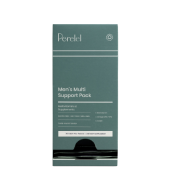Women who are navigating a PCOS diagnosis often face a tough trio: hormonal disruption, insulin resistance and reproductive challenges. That’s where myo-inositol (MI)—especially when paired with D-chiro-inositol (DCI) in the optimal 40:1 ratio—has served as a research-backed, doctor-approved tool.
Why 40:1 Myo‑Inositol/DCI Is the Gold Standard for PCOS Support
Myo-inositol is the main form found in the ovaries and plays a big role in helping follicles mature and respond to key hormones like FSH. It also supports how your body uses insulin.
Normally, your body converts some of that myo-inositol into D-chiro-inositol through an insulin-dependent enzyme. But in people with PCOS, that conversion process often gets thrown off—leading to an imbalance between the two. That’s why supplementing both forms, in the body’s natural 40:1 ratio, can be more effective than taking either one on its own. It mimics what your body is trying to do, and restores balance more effectively than either alone.
What Does the Research Say?
We’re big believers in blending science with support—and when it comes to inositol, the research speaks for itself.
1. For Metabolism & Hormone Balance
Let’s start with the foundation: blood sugar and insulin. A meta-analysis of nine randomized trials found that myo-inositol—on its own or paired with D-chiro-inositol—significantly improved insulin sensitivity. How? By reducing fasting insulin and HOMA-IR (a key marker of insulin resistance), while increasing SHBG, the hormone that helps regulate free androgens.
2. For Ovulation & Androgen Levels
For many living with PCOS, symptoms like irregular cycles, elevated testosterone, and hormonal acne can feel disheartening. But across multiple trials, MI and DCI together have been shown to help bring hormones into balance—lowering total and free testosterone, improving estradiol and SHBG, and even supporting BMI reduction.
3. For Egg Quality & Fertility Support
Thinking about fertility support? Research also points to inositol's role in enhancing egg maturation and fertilization rates—especially during IVF treatments. While more high-quality studies are still unfolding, early data shows promise, especially for patients with PCOS, where egg quality can be a common concern.
4. As a Gentle Metformin Alternative
Metformin has long been a go-to for PCOS, but it isn’t always easy on the body. Some large trials now suggest that myo-inositol may be just as effective at improving metabolic markers—with a gentler side effect profile. That makes it a compelling option for those seeking a more holistic approach to PCOS support.
In Practice: How Hormonal Balance Support Works
Our Hormonal Balance Support includes MI and DCI in that 40:1 ratio, precisely because:
-
It restores the natural MI:DCI balance, supporting both insulin signaling and ovarian function.
-
Includes both inositols to help maintain healthy women hormone cycle rhythms and ovulation.
-
Our formula is clinically proven to support symptoms of hormonal imbalance and menstrual health which in turn supports regular cycles and weight management.
Suggested protocol: 2 pills in the morning and 2 pills in the evening with meals—paralleling study doses. Expect to see changes in cycle regularity, mood stability, skin clarity, and metabolic markers within 12–24 weeks.
Consider pairing with:
-
Lifestyle practices that reduce insulin resistance (check out this nutritionist-informed PCOS diet guide, or this hormone-syncing movement guide)
-
Ongoing care with your OB/GYN or endocrinologist
Shop the Article:
Inositol Benefits, Research-Backed Results
For those navigating the layered challenges of PCOS, inositol in the clinically studied 40:1 ratio offers a thoughtful, evidence-backed approach. While there’s no one-size-fits-all solution, incorporating inositol—alongside foundational lifestyle practices and ongoing clinical care—can be a meaningful step toward more balanced cycles. Specifically, consistent use of this hormone balancing supplement has been studied to support:
-
More regular cycles, often with ovulation returning.
-
Reduction in acne, hair growth, bloating—signs of reduced hyperandrogenism.
-
Stable energy and blood sugar, no sudden cravings.
-
Healthier FSH and estrogen signaling—especially vital for fertility.
Next Up: If you’re interested in investigating your own symptoms, read Is It PCOS or Something Else? 6 Symptoms to Look Out For
This article is for informational purposes only. It is not, nor is it intended to be, a substitute for professional medical advice, diagnosis, or treatment and we recommend that you always consult with your healthcare provider. To the extent that this article features the advice of physicians or medical practitioners, the views expressed are the views of the cited expert and do not necessarily represent the views of Perelel.
Resources:
Croze, Marie‑Laure, and Cécile O. Soulage. Potential Role and Therapeutic Interests of Myo‑Inositol in Metabolic Diseases. Biochimie, Oct. 2013. (Referenced re: cell membrane signaling) Taylor & Francis
Unfer, Vincenzo, et al. “Inositol Is an Effective and Safe Treatment in Polycystic Ovary Syndrome: A Systematic Review and Meta‑Analysis of Randomized Controlled Trials.” Reproductive Biology and Endocrinology, 2023. (Hormonal effects, metabolic outcomes)
Nordio, Maurizio, and Ettore Proietti. “The 40:1 Myo‑Inositol/D‑Chiro‑Inositol Plasma Ratio Is Able to Restore Ovulation in PCOS Patients: Comparison with Other Ratios.” European Review for Medical and Pharmacological Sciences, 2019. (Optimal ratio and ovulation restoration)
Unknown author (Endocrine Society). Inositol for Polycystic Ovary Syndrome: A Systematic Review and Meta‑Analysis to Inform the 2023 Update of the International Evidence‑Based PCOS Guidelines. Journal of Clinical Endocrinology & Metabolism, Nov. 18, 2024;109(12):e2365. (Efficacy, limited and inconclusive evidence) Cureus+6PubMed+6PMC+6
Mojsak, Peter, et al. “Myo‑Inositol Effects in Women with PCOS: A Meta‑Analysis of Randomized Controlled Trials.” Gynecological Endocrinology, 2012. (Fasting insulin, HOMA‑IR, SHBG after ≥24 weeks)MDPI+4PMC+4ResearchGate+4
Frontiers in Endocrinology. Effect of Myo-Inositol Supplementation in Mixed Ovarian Response. March 2025. (Improved oocyte maturity and fertilization rates) Frontiers+1Wikipedia+1
Zagouri, Fanouria, et al. Comparative Effects of Myo‑Inositol and Metformin Therapy on Insulin Resistance and Hyperandrogenism in Women with PCOS. Medicines (Basel), 2024. (MI non‑inferior to metformin, fewer side effects)






















